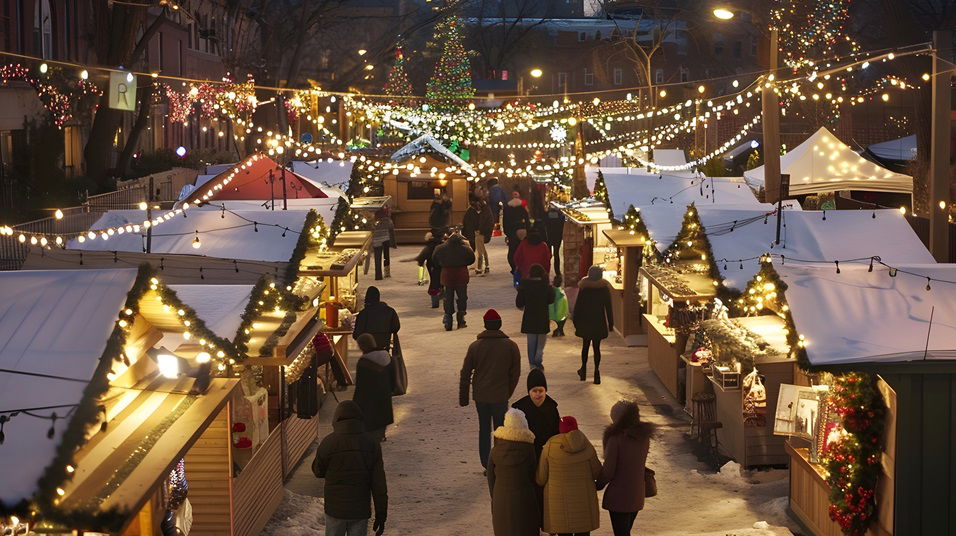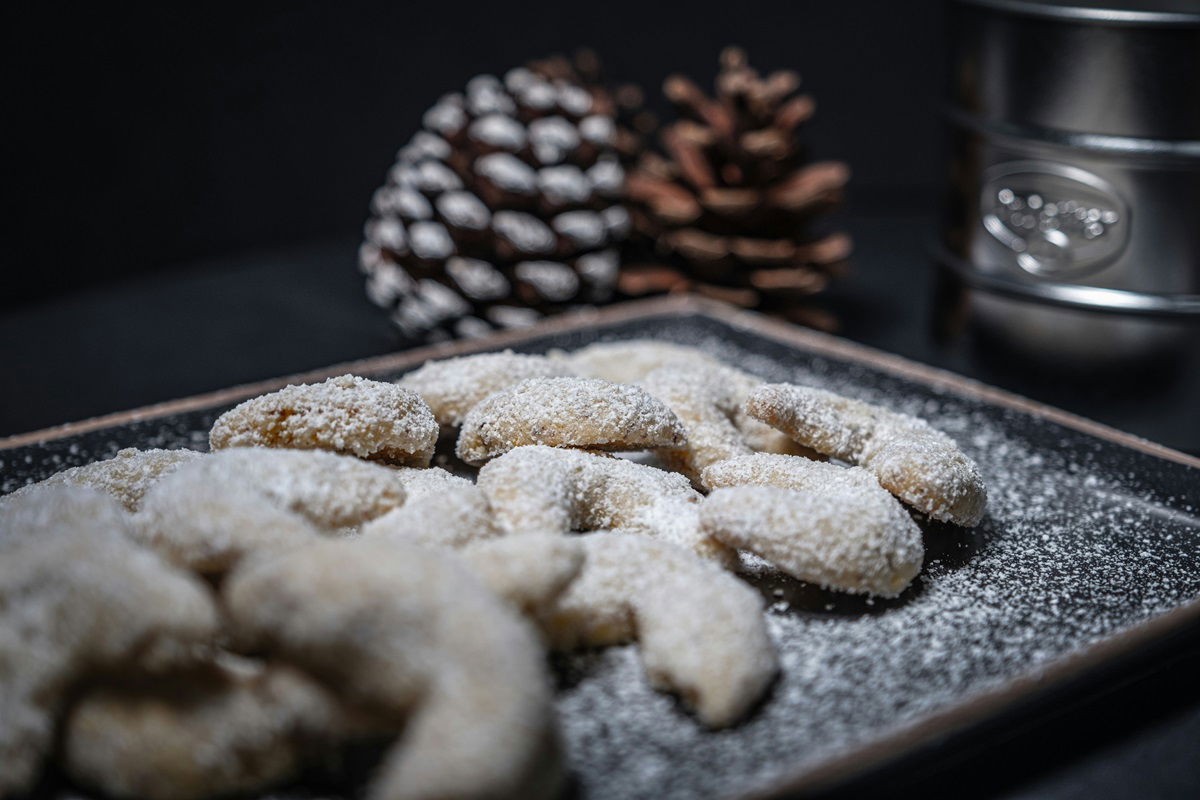
Christmas traditions in Germany
For many people in Germany, Christmas is a very special time. The streets are lit up, and Christmas markets will catch your eye around every corner. Whether you are visiting or have recently moved to Germany, some local Christmas traditions might surprise you. Keep reading to find out about typical Christmas traditions in Germany.
What do people celebrate at Christmas?
In the Christian faith, Christmas is a celebration of Jesus’ birth. Over time, Christmas has become a more neutral celebration that focuses on spending time with friends and family.
Advent
The Advent season celebrates the “arrival” of Christmas in Germany, starting on the Sunday four weeks before Christmas. There are four Advent Sundays in total. Advent is all about preparing for Christmas and embracing the festive spirit.
Advent calendars and Advent wreaths
Advent calendars are especially common among children, with each of its 24 doors holding a little surprise. You open the first door on the first of December and the last one on the 24th, also known as “Heiligabend”, which is the main Christmas holiday in Germany. While Advent calendars traditionally centred around chocolates and other sweets, there are countless variations nowadays, including Advent calendars for adults. These might include cosmetics, jewelry, tea, or muesli. You can even make your own Advent calendar!
Advent wreaths are another common tradition during the Advent season. They are usually made from fir branches and decorated with colourful Christmas baubles and other seasonal ornaments. But the four candles pull it all together: each Sunday during Advent, you light one more candle until all four of them get to shine bright on the 4th Sunday of Advent.

Saint Nicholas Day
Saint Nicholas Day ("Nikolaustag") takes place on 6 December every year and celebrates St. Nicholas, a real-life person who did many good deeds and helped people in need. On the night of 5 December, children commonly put their “Nikolausstiefel” (Nicholas boots) outside their room or front door. And on the morning of the 6th, they get to wake up to chocolates and other sweets inside, courtesy of St. Nicholas.
St. Nicholas also visits young children in kindergartens to read from a golden book that knows if they have been good that year. He is often accompanied by his helper “Knecht Ruprecht”, who reprimands children who have been naughty. Usually, teachers or family members will disguise themselves as St. Nicholas and Knecht Ruprecht.
Even companies or organisations swap chocolate Santa clauses on Saint Nicholas Day. So you might get a tasty treat on this day in Germany!
Christmas markets
German Christmas markets ("Weihnachtsmärkte") have long made it big in other countries, brightening people’s hearts and faces. Besides the famous food and drink, including mulled wine and roasted almonds, Christmas markets also feature stalls with seasonal decorations as well as fine arts and crafts. German Christmas markets tend to be busiest on weekends and in the evenings, when people meet up with friends for mulled wine or non-alcoholic punch after work. Most markets open on the weekend of the first Advent and close a few days before Christmas Eve. Have a look around!

Christmas tree
Germans love their Christmas trees! Most households set theirs up in their living room and decorate it with Christmas baubles, figurines, tinsel and LED lights or even real candles. The tree topper is the literal star of the show, though many people now opt for other decorative options, including angels or pointy glass ornaments.
By the way: You will also see large Christmas trees in market squares, shopping centres or businesses during the Advent season.
Santa Claus vs Christkind
Who drops off the children’s Christmas presents? Santa Claus or the “Christkind” (“Christ Child”)? In Germany, that depends on the region. In the south, the Christkind usually makes an appearance, while Santa Claus is more common in the north and east of Germany. The Christkind has a more religious undertone as it symbolises baby Jesus.
Nativity play
In Germany, nativity plays are usually performed during church services on Christmas Eve. Some schools or kindergartens also rehearse the nativity scene and perform it for their families during the Christmas season. However, because of Germany’s cultural diversity, this has become less common over time.
Christmas holidays
Christmas Eve is Germany’s main Christmas holiday, an exciting day for children and adults alike! Celebration styles vary across the country: people of the Christian faith typically go to church on Christmas Eve and then have Christmas dinner at home. Some families still enjoy the traditional German Christmas meal, which consists of sausages and potato salad. Others may have a more elaborate feast, including dumplings, red cabbage, roast duck or goose.
As it has become less common to attend church on Christmas Eve, many households start by having Christmas dinner and singing Christmas carols before exchanging gifts, which is often the highlight of the season. Everyone unwraps the presents that the Christkind or Santa Claus left them underneath the Christmas tree. By the way: Exchanging christmas presents is called "Bescherung" in Germany. What types of gifts you give and whom you celebrate Christmas with is up to you. Some people celebrate Christmas Eve in the traditional sense, surrounded by family. Some prefer spending time with friends, while others may have Christmas dinner with their families and meet up with friends afterwards.
Christmas is no longer strictly tied to the Christian faith in Germany but more about spending quality time with loved ones. That makes “Fest der Liebe” (“festival of love”) a more accurate title for this special day. On Christmas Day and Boxing Day, people usually visit relatives or take some time for rest and reflection.

Three Kings’ Day
Finally, there is also a post-Christmas day to consider: 6 January is “Three Kings’ Day” ("Heilige Drei Könige") in Germany. This goes back to the three kings who came to see baby Jesus in the manger and bring him myrrh, frankincense and gold.
On and around this day, children from Christian church congregations dress up as the three kings and go to people’s homes to sing songs and collect donations for charitable causes. They also “bless” the home by leaving a chalk mark above the front door. So do not be surprised if children in costumes appear at your doorstep and start singing. ;)
We wish you a lovely Advent season and a very merry Christmas!
More about living in Germany
FAQs: Christmas in Germany
Christmas is from 24 to 26 December, with the 24th being Christmas Eve, the 25th Christmas Day ("1. Weihnachtsfeiertag") and the 26th Boxing Day ("2. Weihnachtsfeiertag").
You can wish each other “Frohe Weihnachten” (“Merry Christmas”) or “Frohe Feiertage” (“Happy Holidays”) throughout December – if you are not going to see each other before Christmas Eve. Otherwise, you would say it on Christmas Eve.
Christmas ends after Boxing Day ("2. Weihnachtsfeiertag") on 26 December.
Nowadays, Christmas customs and traditions vary quite a lot in Germany. Traditionally, many people go to church and watch the nativity plays on Christmas Eve. The traditional German Christmas meal is sausages with potato salad. Many people also sing Christmas carols around Christmas time. The most common Christmas tradition in Germany is “Bescherung”, the gift-giving portion of the Christmas festivities.
In some regions, Santa Claus (“Weihnachtsmann”) brings Christmas gifts, and in others, it is the “Christkind”. The Christkind symbolises baby Jesus.
In the Christian faith, Christmas is a celebration of Jesus’ birth.








